If you walked up to a person at your gym and asked them who their favorite weightlifter is, what would their answer be? Not so long ago, they likely would not have had an answer at all or maybe said Arnold Schwarzenegger, completely unaware that the sport of weightlifting even exists. Fortunately, times are changing, with increases in participation worldwide and at the very least a vague recognition of the concept of a snatch or clean and jerk. But back to the original question: what do you think the answer to the question, who is your favorite weightlifter might be? You might hear, Pyrros Dimas! And why shouldn’t you? As the most decorated Olympian in our sports history, a massive celebrity in Greece, and Technical Director in the United States, Pyrros’ legacy is difficult to avoid. Maybe they’ll exclaim, Lydia or Mattie Rogers, especially with the anticipation of the next Olympics. The 2020 Olympics brought significant attention to weightlifting, and many athletes have become fitness inspiration for both new and seasoned lifters.
More than likely though, the answer you’ll get is, “Mattiecakes!” In a world increasingly dominated by social media, there is virtually no doubt that the title of the world’s most famous Olympic weightlifter is the United States’ own, Martha Ann Rogers. Pyrros may have three Olympic golds, but was he featured in Elle magazine? Lydia may capture the hearts of men and women alike, but she is eclipsed by the near half million Instagram followers Mattie Rogers has cultivated by doing nothing other than training her ass off.
And why shouldn’t she be this well renowned? What we’re currently watching Mattie Rogers do as an athlete is nothing short of incredible. She’s broken American Records so frequently that it is impossible to keep track. She currently holds eight American Records across three different categories. Her rise in the sport of Olympic weightlifting is nothing short of meteoric.
At last year’s World Weightlifting Championships in Anaheim, CA, she broke a twelve year dry streak by becoming the first American woman to medal at a world championships, since Cheryl Haworth in 2005. A positive drug test in her weight class suggests she’s soon to be promoted to silver, further highlighting her potential for the next Olympics.
I was excited to get a chance to sit on a call with this Xendurance Athlete and learn more about her vision towards the 2020 Olympics, life outside of weightlifting, her favorite nutrition products, and her no nonsense attitude about the process.
Sean Rigsby (SR): I know that you were a very high level cheer athlete growing up. I’m curious as to how a cheerleader makes the leap to weightlifting? What inspired you or how did you get roped in to picking up a barbell for the first time and when did you realize this is something I’d like to really dedicate my time to?
Mattie Rogers (MR): I was actually a gymnast for twelve years before doing cheer. I enjoyed gymnastics but I grew tall very quickly, which made my dreams of going to a high level much more difficult. My Cheer coach in Florida was a CrossFit athlete who used to give us WODs at the end of Cheer practice to stay in shape. I really liked the workouts and he brought me to Danny Camargo’s CrossFit gym. This is the gym I train at to this day and Danny has been my only weightlifting or CrossFit coach.
I did CrossFit for about a year had a lot of fun with the workouts because of the variety. Mixing the lifting, running, and getting to do gymnastics movements again made it interesting. After a while, I had to really focus on lifting more because I wasn’t as good with lifts compared to bodyweight movements.
In gymnastics, you’re so used to moving just your own body around an object, rather than an object around your body. And the weights were so much heavier than just my bodyweight. My legs were like giraffe legs, there was nothing to them that helped me lift better.
When I first started focusing on weightlifting, I hated squatting. I would skip squats so often, until I realized I was almost snatching and cleaning the same, so I probably shouldn’t do that anymore. I did a few local competitions and then I did my first National Competition, Juniors in 2014. That was the first time I saw people in Team USA gear, and I honestly didn’t know that weightlifting was even an Olympic sport until then. That was when I decided to go all in. Moved in with my mom and
SR: So did you have Olympic aspirations when you trained gymnastics that you felt rekindled by weightlifting? MR: Oh, yeah. For as long as I can remember I wanted to be an Olympian in gymnastics. But towards the end of elementary school I got tall fast, and I was doubting if that was a realistic goal. And cheerleading isn’t an Olympic sport so I didn’t know what else to do. But getting involved in weightlifting gave me a chance to pursue that and try to go as far as I can.
SR: Last year you were given a note from CEO Phil Andrews requesting permission to miss class for the World Championships. What have you been studying and do you enjoy pursuing education? MR: I’m currently majoring in Sport and Exercise Science, which is pretty applicable I would say. I’m actually transferring to the University of Central Florida. I really enjoy being a student, but I didn’t enjoy the general education part. I found that boring and am so happy to be past that. Getting into anatomy and the specialized classes for my major is so interesting. I don’t just want a degree to have it, I want to know how everything works. I want to be able to apply to my training, my coaching, and have a sound background in science.
SR: If new and conventional media is any indication, you are essentially the most famous weightlifter in the English speaking world. You seem comfortable in your own skin and sharing your life on social media, but how, if at all, would you say the level of attention has changed you? MR: I don’t know if it’s changed me, but it may have made me more of a private person than before. I’ll share some things, but I definitely try not to share every aspect of my life. Before it was my mom, grandma, and four friends from high school and I would post whatever. I mean, I don’t really filter what I put up, even though I probably should a little more. But it definitely makes me more aware of what I’m doing when I’m posting.
SR: I think what people like about you so much is that you appear not to filter, and that makes you look like a genuine human being. You’re not putting idyllic B.S. on the internet. But it sounds like the attention has made you value your privacy more. MR: Yeah that’s a better way of saying. If I go to an event or a meet, or even just around my home, I’ll get recognized and it feels weird. And sometimes, you just don’t want to talk to people, but you can’t be a jerk and tell people to go away. It’s fine to an extent, and I appreciate people are excited and supportive. But maybe some common sense on when to do it would be better. A good time not to come up to me would be after Olympic Trials as I’m leaving the warmup room, very upset.
SR: You’ve had the opportunity to travel to several different parts of the country and abroad while representing Team USA. Where would you say has been your most memorable travel experience, even if not weightlifting related and why? MR: Most memorable, though not necessarily in a good world, was Junior Worlds in 2015. We went to Poland and they lost all of our luggage. Everyday one suitcase would show up. I got mine the night before we left, after I had already competed. I was washing my underwear in the sink, trying to find food I could eat since my snacks got lost and I was cutting to 63kg then.
SR: Wow, did you pack your kit separately though? MR: Oh yeah, it was the one time that actually paid off. So glad I do that regularly.
SR: Life after sports is a monumental concept to handle for some athletes, especially when you have spent years focused on one all consuming task. Do you ever think about what challenge you’d like to face after weightlifting and what you’d like to do next? MR: It’s hard to say, because a weightlifting career can span a long time, deep into your 30s. I know I want to ride it out and be a competitive weightlifter as long as I can. That is part of why I’m going to school, so I have something setup for after. But I think I’d like to do something with athletes medically. I assume I’ll be a coach forever, but I don’t really want to own a gym. Maybe not necessarily Team USA medical staff, but something similar in a gym where I can help the athletes with recovery and soft tissue work.
SR: Visualization appears to be a big part of your method for performance. Can you tell me a bit about your practices and how you focus yourself for performance, whether it be in the gym or on the competition platform? MR: About eight months before Olympic Trials, I read a book called, “The Art of Mental Training”. It’s a small, short book, but it really changed how I prepare for competitions. It taught me how to visualize and tune out a lot other thoughts. Often before I go to bed, I’ll visualize myself preparing, from chalking up, to lowering the bar from overhead. I’ll visualize it for both snatch and clean and jerk. I try to make every detail as realistic as possible. Don’t lie to yourself and say it’s light if you know the attempt will be heavy. I’ll visualize going through and making the lift, over and over and over again. So when it comes time on competition day, there are no second thoughts. Your body is ready and your mind is there. You just go and put the two together.
SR: Are there any technical issues in your snatch, clean, or jerk that you feel like need a lot of attention, and if so, how do you approach correcting them? What sort of exercises might you use? MR: I always feel like there are so many things wrong. Everyday I feel there is something I need to go work on. For me right now, in both snatch and clean, I’m working hard staying over the bar. I’ve gotten in a habit of letting my shoulders reach back too far and putting the hips forward. I’ve done more block and hang work for both lifts to work on it. But really it’s just about actively thinking about it and forcing myself to do it better, instead of just going through the motions. There is no specific drill, but being precise in the movement is the only way to really fix it.
SR: Yeah, I think that’s important for a lot of people to hear. There is a huge desire in the exercise community for “secrets” to elite performance. I would contend that it’s really as boring as consistency, hard work, and mental fortitude. What do you think, and do you have any secrets worth sharing? MR: No. You just have to do it better. There is no secret. A lot of people think there is some magic program, or gym, or atmosphere, or coach and there isn’t. You have to snatch, you have to clean and jerk, you have to squat and pull and press. People want to do banded, chain, power whatevers. Just do the lifts. Do them a billion times more. And that’s all there is to it. There’s definitely better and worse coaches or programs, but I don’t understand the impatience people have. Especially the gym hopping that I see a lot now.
SR: So you would say it’s great when you have great coach and program, but ultimately it falls to you to put the work in? MR: Sure there are some coaches who are better than others. But people spend a little time and when they stop PRing everyday, or even every cycle and they go somewhere else looking for something. You’re not going to medal at nationals every time, or make every team, or PR every training cycle.
SR: Yeah I see a lot of people who are maybe a year in, start having breakdowns when they don’t PR often. And I have a hard time with giving them any empathy. I’ve watched elite level weightlifters not PR for three years. I haven’t hit a true PR since 2015. MR: Yeah I haven’t PRed my snatch in about two years at this point. But that’s just part of the process. You have to stick with the program and work.
SR: What does your training week look like? How frequently do you perform the olympic lifts or their variations? How frequently do you perform strength lifts or accessory exercises in a given week? MR: Usually I’ll do about eight training sessions a week. Monday through Saturday, with Monday and Friday being two-a-days. On those days I’ll do squats and presses in the morning, sometimes some core and light technical work. I do a lot of accessory work, some pretty much every day. I’ll alternate between bodyweight, gymnastics type movements and bodybuilding type isolation movements. I squat four days a week. There’s some form of pressing, pulling, and technical work everyday. We breakup sessions to focus on just snatch or clean.
SR: Do you enjoy coaching athletes and do you feel that may have a place in your future? What kind of athlete do you prefer coaching, ie youth, adult, male, female, etc? MR: I think I enjoy coaching the kids the most. But I’ll coach anybody willing to learn. That’s my favorite type of athlete, someone with an open mind. I think tend to prefer the kids because finding ways to explain to them is fun. With an adult, you describe the movement and they want explanations or the science behind movement. With a youth, you have to break it down simply. Designing a new way to explain it is like solving a puzzle, and when a kid PRs or something clicks, the excitement on their face is the best.
SR: It’s really hard to keep up with how many times you break American Records, sweep medals at a national event, or even podium at international meets these days. What moment thus far in your weightlifting career stands out as really memorable amongst all of your accomplishments thus far? MR: I guess it has to be Worlds this past year. It’s my first World level medal. A little bittersweet with how close the totals ended up. But standing on that podium and medaling was amazing.
SR: Looking ahead, the goal has to be getting to Tokyo. With all the uncertainty surrounding weightlifting on weight classes and qualification procedures, does your game plan change at all? MR: No. Because whatever happens, I can’t change any of that. None of that affects my performance or what I can control. I know the only thing that will matter is me performing at my best.
SR: What keeps you determined to keep going in the daily grind? Other than becoming an Olympian, do you have any special goals you’d like to hit? More American records? More International Medals? Best some rivals? World records? Is there anything you can achieve that you feel will bring you the contentment to stop weightlifting? MR: I don’t think I’ll ever be content. Even if I’m 35 competing internationally, I’ll try to find ways to keep going one more year or meet. My two main goals every year are to compete well at the Pan-Am and World Championships. At Pan-Ams I want to win. I’ve gotten silver the last two years, so the gold medal is what I want to see happen this year. At Worlds, I want to stay on the podium, if not take the gold and become World Champion. We’ll see how the doping clean up continues to go.
SR: So you want to be Pan-American and World Champion? MR: Yeah. Pretty much. SR: I’m glad somebody has the belief to match their ability and is ready to do it.
SR: Since it’s in the news, and I know you’re tired of hearing about it, how does a positive doping test in your weight category make you feel, especially when it potentially deprived you of standing a step higher on the podium? What is your outlook on the future of doping in sport? Do you think we can really clean it up, or will it ultimately just be part of the game we have to accept? MR: The fact of the matter is people will dope, and I know they will cheat. But there’s nothing I can do to change that or hope they get caught. I have to compete against them with the best of my ability. I was super pumped about bronze, but am still happy to hear I may be getting the silver. I know they tried very hard to make this years Worlds as clean as possible, and I hope that they continue to be that rigorous going forward.
SR: I hope so. I hope that when it’s not hosted in the United States the same scrutiny is there. MR: Yeah, I think next years Worlds will really be the test for whether or not drug testing is going to stay this way and if the sport really being cleaned up.
SR: Do you utilize any specialized recovery methods on a regular basis, such as massage, dry needling, cupping, or cryotherapy? If so, what do you feel has significant benefits? MR: I see a P.T. once a week who will do graston and other soft tissue work. I also have had cupping done, which I think can be helpful. I do a lot of stretching on my own at night before bed or on Sunday when I’m home. The most important thing is fueling my body correctly. Eating the right food and enough of it. There’s not a lot you can do to force your body to recover better outside of eating the right things and getting enough sleep.
SR: So you prioritize things like sleep and nutrition for daily recovery routine? And how do you make sure these things optimized? MR: Yeah. I try to stay on a pretty regular sleep schedule. The routine helps me fall asleep at night so that I can continuously get up at the same time for training.
SR: I know you work with RP Strength and have been very happy with weight management going up a weight class and fueling your training. What’s your go to RP approved meal, and what’s the go to cheat meal? MR: I don’t know. I eat so clean all the time that I don’t even think of it as clean anymore. It’s just how I have to eat. It’s hard to say I have something that’s a favorite, because pretty much everything I eat is diet approved. I’ll meal prep or order from a local health foods company to make sure everything is right. But I do really like to get wings from Uber Eats so I can just sit on my couch on Sunday and eat wings.
SR: Yeah! What kind? MR: Just regular hot wings. I like to sit on my couch eating hot wings and watch Hot Ones on YouTube.
SR: That’s awesome. So big surprise, getting regular sleep and controlling your nutrition are the most important factors for your recovery? MR: Yup. Pretty much.
SR: Which Xendurance products do you feel help you the most from day to day? Do they play a role in your normal diet? And do any feel like they give you extra energy? MR: Both the Fuel-5 and the Protein help me a lot. I do an intra-workout drink that help me stay fueled. I train so frequently that I’m constantly hungry, and the Fuel-5 especially helps me not feel that way. I can’t even remember the last time I didn’t have both of these with me during training. In morning training sessions I’ll use the Fuel-5+ to help wake up a little. Every night before bed I’ll take the Omega+D3 and Immune Support so I have all the micronutrient support I need. I also really like the Extreme Hyrdo-X since it can get really hot in Florida and I usually won’t drink enough water. It’s tastier than water to me so it will actually get me to drink more liquids than I otherwise would.
SR: I know you love music and that your boyfriend is a musician. Do you play any instruments? MR: I don’t anymore, but I used to play trombone in band, jazz band, and marching band all throughout junior high and high school.
SR: What are your favorite bands to listen to when you’re training, relaxing, and driving? MR: I don’t think I have a favorite since I listen to so many different genres. I probably listen to EDM the most, but I also listen to a lot of punk rock. It’s just really hard to pick between all of them.
SR: I get it! Well, thanks for taking the time to answer my questions and best of luck with your training going forward. MR: Oh no problem. Thank you for the fun conversation.
I came away from our talk with a reinforced admiration for Mattie. It was obviously never in doubt, but hearing a driven person shut down the culture of instant gratification in fitness and talk about normal things like eating wings on your couch was incredibly relatable. Team USA and Xendurance Athlete Mattie Rogers is a weight slaying, medal winning, wing eating, trombone playing machine with no signs of slowing down on her journey towards the 2020 Olympic Games.



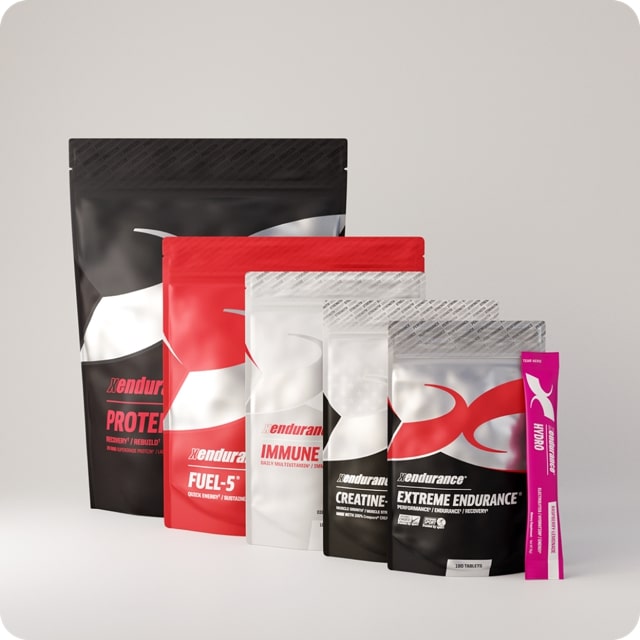
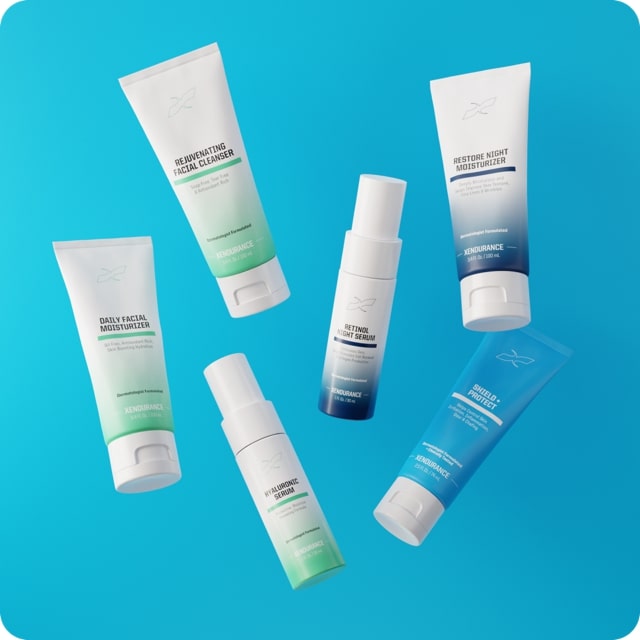
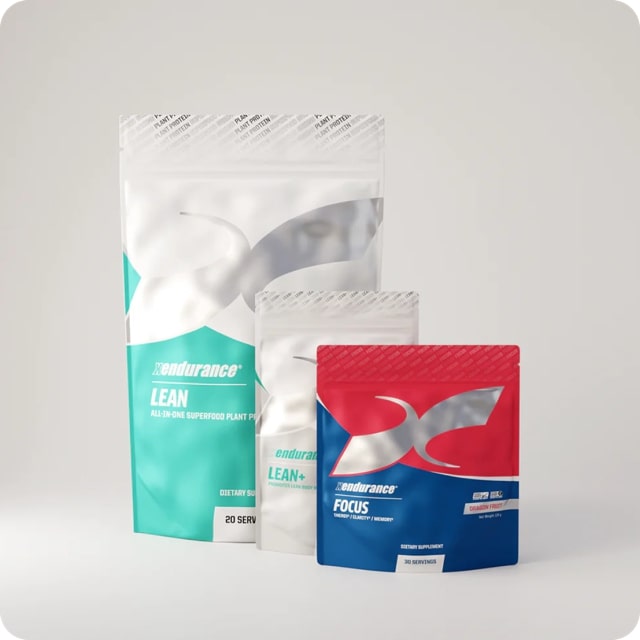
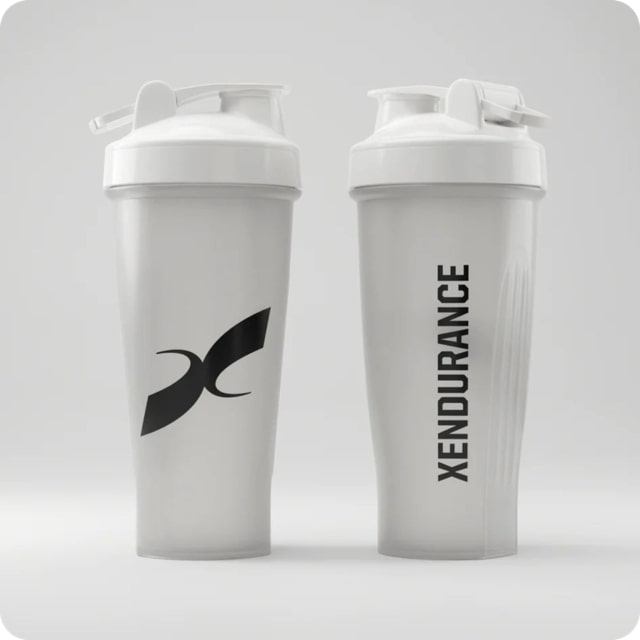
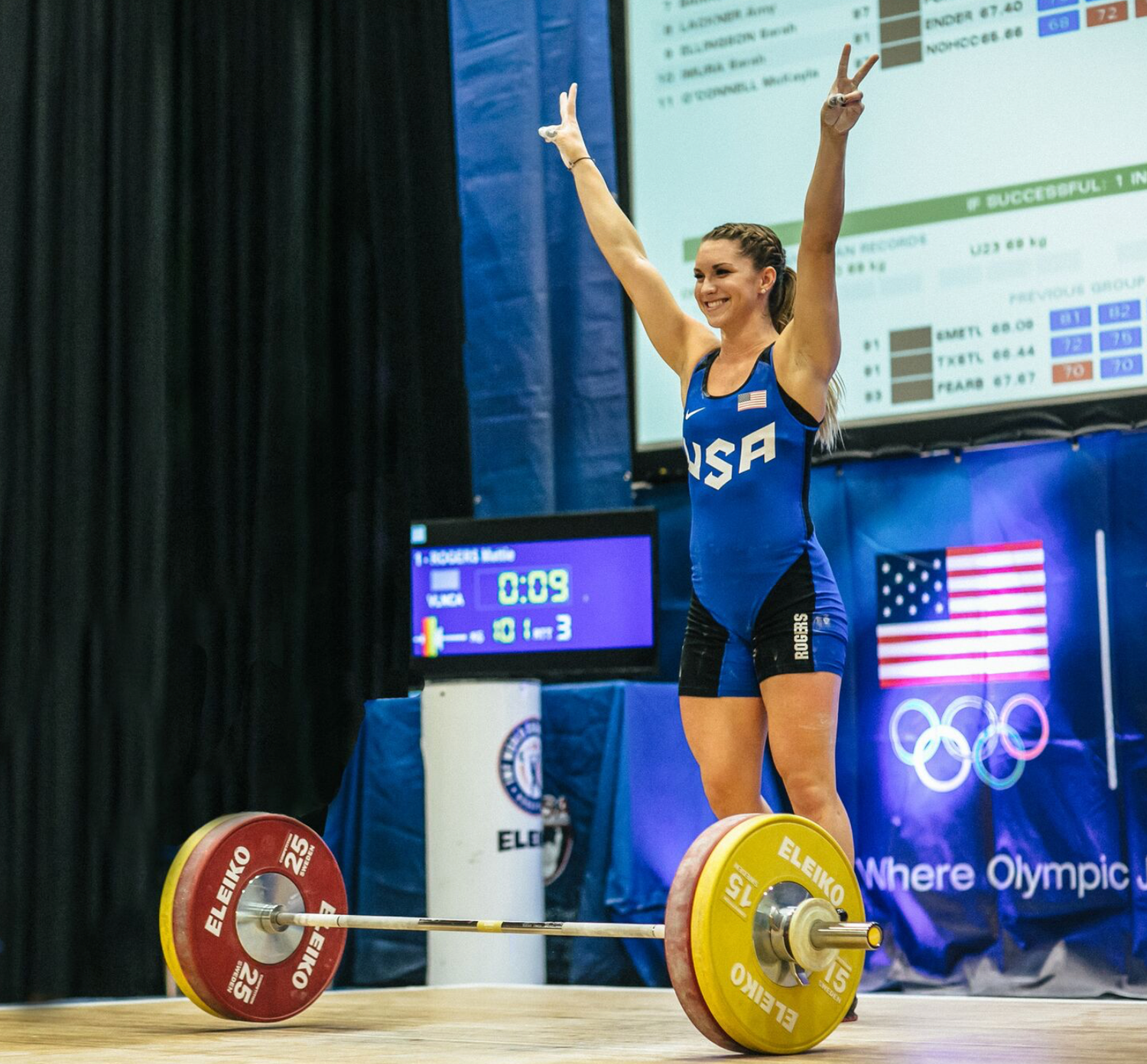
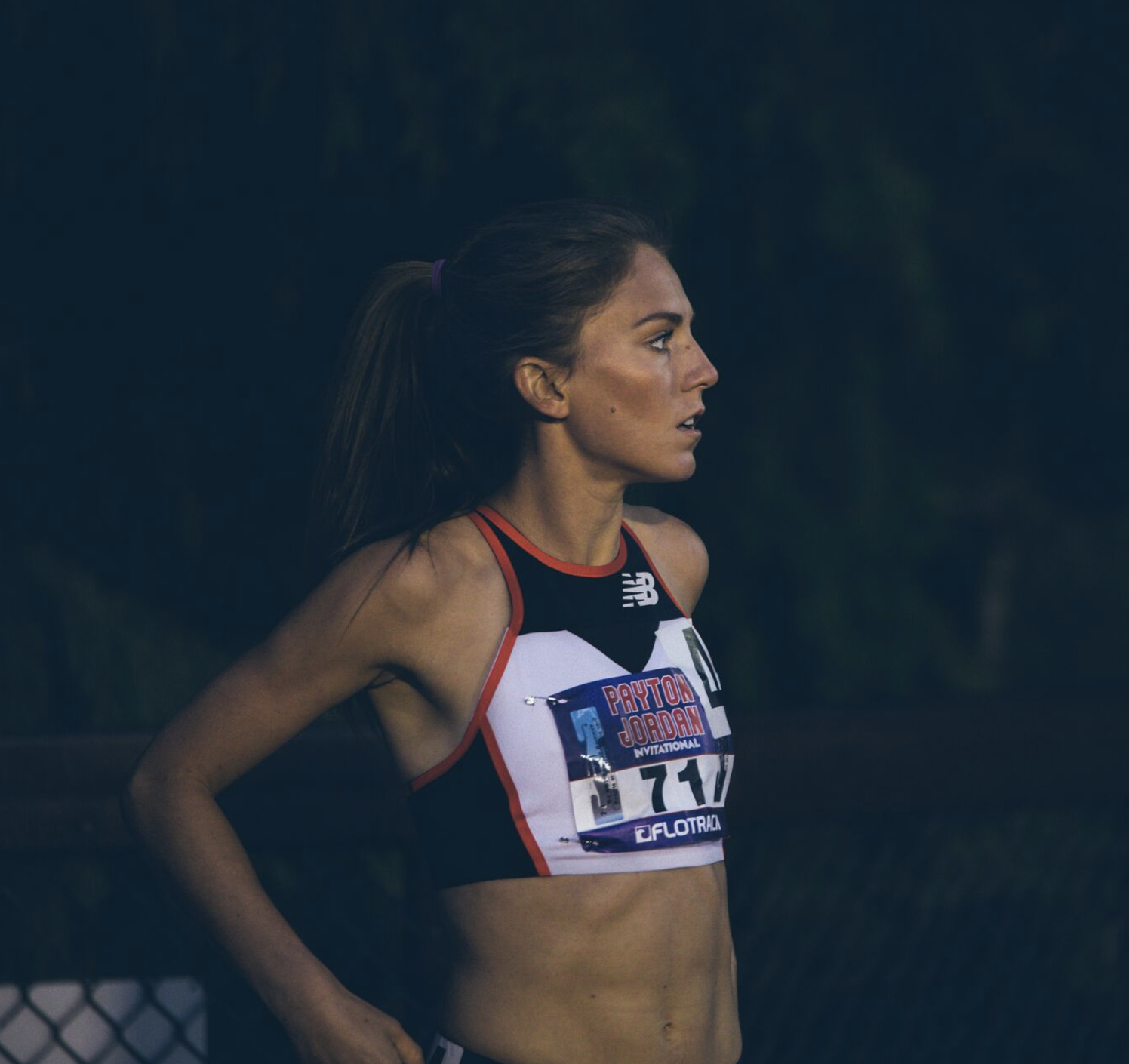

Leave a comment
This site is protected by hCaptcha and the hCaptcha Privacy Policy and Terms of Service apply.